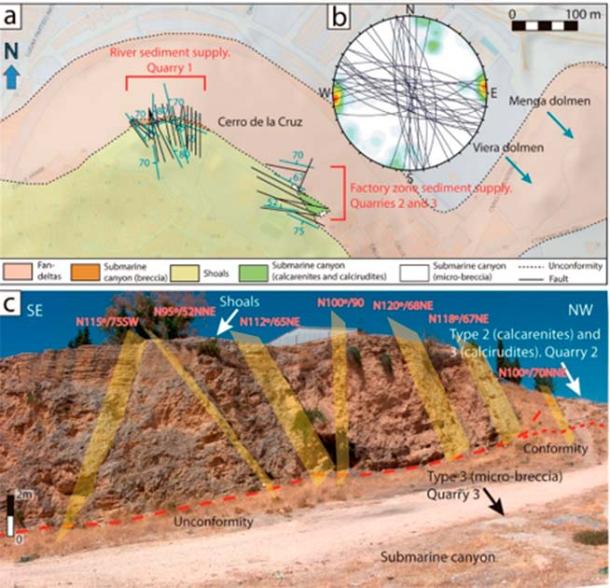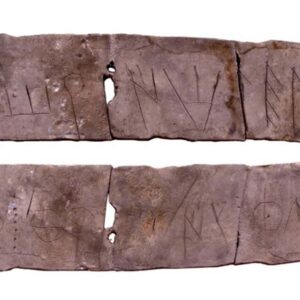Up to date
8 December, 2023 – 17:55
ashley cowie
Menga Dolmen Unveiled As “The Best Neolithic Engineering Marvel”
- Learn Later
A staff of archaeologists has deciphered the hidden Neolithic constructing dynamics inside Spain’s 5,700-years-old Menga dolmen. Not solely had been refined engineering and constructing methodologies found, however the tomb’s alignment with surrounding hills provided guests an other-worldly mild present.
“One of many biggest engineering feats of the Neolithic,” is how the Menga dolmen, in Antequera, Málaga, Spain, is described in a brand new examine published in Scientific Stories. Dated to round 5,700 years in the past, and situated atop a hill with big stones, that is the most important recognized megalithic construction inbuilt what’s right this moment, Europe.
The authors, a multidisciplinary staff of archaeologists, geologists and historians, have rigorously demonstrated how this historical burial web site was constructed utilizing wooden, ropes and cleared tracks.
One of many monumental menhirs throughout the construction is estimated to weigh greater than 100 tons, so some well-planned methodologies had been at play. The paper reveals not solely how the burial mound was constructed, however from the place the stones had been sourced, and the way they had been transported, undamaged, to the highest of the sacred hill.

Creative illustration of quarrying actions for the extraction the capstone C-5 in Cerro de la Cruz Quarry No. 2. (Moisés Bellilty below steerage of José Antonio Lozano Rodríguez and Leonardo García Sanjuán /Nature)
Trendy Tech Disclosing Historic Secrets and techniques
The analysis staff found that stones across the edges of the burial chamber had been assembled in what they name “an interlocking style.” It was found that this particular design served as a system of water channels to divert, seepage, to stop erosion and lengthen the longevity of the tomb. Moreover, the brand new analysis reveals archaeoastronomical issues within the construction’s orientations, for it was intentionally aligned with close by mountains, “in a means that creates complicated mild patterns contained in the chamber.”

Inside of the Menga dolmen is 5 meters (16.40 ft) broad and three meters (9.84 ft) excessive, and has a inventive design, aligned with mountains. (Angel M. Felicísimo/CC BY 2.0)
The examine explains that to higher perceive the composition of the stones, “petrographic” and “stratigraphic” evaluation strategies had been utilized. The previous entails finding out rocks below a microscope to establish minerals, assess texture, and perceive their formation, whereas the latter focuses on the association and traits of rock layers to decipher the Earth’s chronological historical past and environmental adjustments. Primarily, these two evaluation strategies reveal the geological processes related to the evolution of the Earth over time.
- Rock-Minimize Tombs in Turkey Could also be A part of Largest Necropolis within the World
- Unbelievable Discover of Europe’s Largest Megalithic Website In Spain
A Gargantuan Labor Effort Uncovered
The outcomes of the petrographic and stratigraphic evaluation decided that the stones had been largely calcarenite sedimentary rocks. Categorized by geologists as “mushy stones,” they’re primarily composed of sand-sized carbonate grains, similar to fragments of shells and skeletal particles which kind porous and permeable deposits. In line with the brand new analysis, as a result of any such rock is comparatively fragile, transporting them, undamaged, to the hill high, would have been exceptionally difficult.

A) Geological map of tectonic jointing on DTM, displaying the situation of Menga and Viera and the probably excavating areas at Cerro de la Cruz. b) Stereographic illustration of the teams of joints. c) Overview of the tectonic fracturing current in quarry areas #2 and #3. (Moisés Bellilty below steerage of José Antonio Lozano Rodríguez and Leonardo García Sanjuán /Nature)
The staff mentioned “a sure stage of engineering sophistication,” should have been current to have organized such “a large planning and engineering” undertaking. Particularly, the paper explains that transporting the roof stone (or capstone) alone would have been significantly troublesome. It is because that one stone is estimated to weigh “roughly 150 tons.” Placing this in trendy perspective, the Area Shuttle Orbiter, just like the Area Shuttle Endeavour, had a liftoff weight of round 100 tons.
- Two Megalithic Bronze Age Dolmens Excavated in Southern Spain
- Dolmens and Devilish Myths of the Wéris Megaliths, Belgium’s Stonehenge
The Street Forward
The staff examined a number of fashions making an attempt to reply how precisely the individuals moved the large stones, undamaged, and so they derived strategies incorporating heavy grass ropes, specialised knots, wood scaffolds, gravity, and a variety of low season farmers. Nonetheless, one other crucial requirement for the unmarked supply of the stones was cleared and stage roads, or methods.
Lots of the world’s monumental landscapes are crisscrossed with long- distance tracks, roads, commerce routes and ceremonial methods. There was a second in time, completely different from nation to nation, the place farming communities started elevating monumental menhirs, vertically, however on the similar time they cleared, leveled, and rolled out long-distance roads on the horizontal airplane. Whereas historical roads had been used for the transport of stones, in lots of instances, in addition they symbolically unified vital spots within the broader panorama, and sky, into their cosmological notions, which they fused onto hill tops with huge stone tombs.
Prime picture: Menga Dolmen in Malaga, Spain. Supply: Tony Makepeace/CC BY 2.0
By Ashley Cowie





